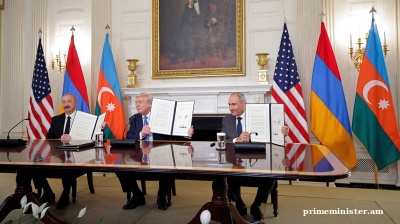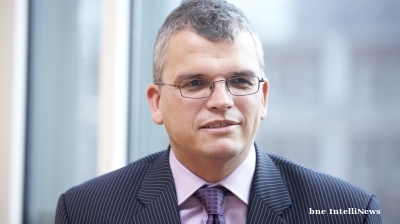Turkmen President Serdar Berdimuhamedov started 2023 with a major foreign visit.
Berdimuhamedov went to China, Turkmenistan’s leading trade partner and a country that seems destined to become even more important to Turkmenistan in the coming years.
The visit had mixed results. Politically, Turkmenistan drew a bit closer to China, but in terms of trade, which is the basis of Turkmen foreign policy, there did not seem to be much progress.
Just visiting China was important for Berdimuhamedov.
He easily won the rigged Turkmen presidential election in March 2022, taking over from his father Gurbanguly Berdimuhamedov who had been president of Turkmenistan since December 2006.
The new Turkmen president made four official visits during 2022: to Russia and then Iran in June, to Uzbekistan in July, and to the United Arab Emirates in November.
When Serdar attended the Shanghai Cooperation Organisation (SCO) summit in Samarkand, Uzbekistan last September as a guest, he met Chinese President Xi Jinping briefly on the sidelines.
But a visit to China by the new Turkmen president was essential.
Symbolically, it was vital for Serdar to pay an official visit to such a key ally and confirm China’s interests in Turkmenistan would be respected by the son as they had by the father.
The highlight was the announcement China and Turkmenistan were elevating their bilateral relationship to a “comprehensive strategic partnership.”
A Chinese Foreign Ministry statement about that partnership, however, failed to shed much light on the terms of the elevated relationship, saying “the two countries need to jointly pursue the path toward development and rejuvenation … and fully tap the potential for cooperation to realise common development.”
Of more substance was Xi’s comments summing up ties between the two countries.
The Chinese president said at his meeting with Berdimuhamedov, “Natural gas cooperation is the cornerstone of the China-Turkmenistan relationship.”
More than just a “cornerstone” actually.
Turkmenistan supplies about half the natural gas China imports through pipelines.
For more than a decade, China has been Turkmenistan’s largest gas customer and in recent years has been, essentially, Turkmenistan’s only gas customer.
Berdimuhamedov noted in an article published during his visit by the People’s Daily, the newspaper of China’s Communist Party, that since the first pipeline from Turkmenistan to China started operation in December 2009, Turkmenistan has shipped some 350bn cubic metres (bcm) of gas to China.
Turkmen government statistics are notoriously unreliable or, just as often, entirely unavailable, so it is difficult to say what percentage of export revenue comes from gas sales, but it is believed to be more than 80% and possibly closer to 90%.
Turkmenistan would like to sell more gas to China and there are plans to build Line D of the Central Asia-China gas pipeline network to add to existing strands A, B and C.
Line D would have a capacity to carry an additional 30 bcm of Turkmen gas to China but construction of that part of the pipeline network has been repeatedly delayed.
A joint statement released at the end of the Xi-Berdimuhamedov meeting said the two countries would “accelerate the implementation… of construction of Line D….”
Considering almost no construction has been done on Line D to date, accelerating work on the strand would not take much and it would not mean the pipeline would be completed anytime soon.
The joint statement also mentioned accelerating “the second stage of industrial development of the Galkynysh gas field”.
Galkynysh is one the world’s largest gas fields. The British firm Gaffney, Cline and Associates announced in October 2008 that its audit of the field showed a low estimate of 4 trillion cubic metres (tcm) and a high estimate of 14 tcm.
As with Line D, there is no commitment to any timeframe for further development of Galkynysh. And anyway, Turkmenistan’s main problem is not gas production, but gas customers.
China does not seem to need a Line D full of extra gas from Galkynysh right now.
Russia’s Power of Siberia pipeline to China has increased its capacity from some 10 bcm in 2021 to 15 bcm in 2022 and plans call for increasing that volume to 38 bcm in the coming years
And roughly two-thirds of China’s gas imports arrive as liquefied natural gas (LNG).
It does not appear Serdar Berdimuhamedov’s visit to China yielded any major breakthroughs, but it was important for Turkmenistan’s immediate future.
Serdar’s first foreign visits, to Russia and Iran, showed the intended direction of Turkmenistan’s foreign policy.
Serdar studied in Russia and simultaneously had a position at the Turkmen Embassy in Moscow.
Iran is an immediate neighbour and modest gas customer, though the two countries have recently been discussing a stepping up of Turkmen gas supplies.
But the Russian and Iranian governments are international pariahs and increasingly so in recent months. The future prospects of the current regimes in the two countries are unclear.
China’s government and position in the world are stable. That gives an extra significance to the Turkmen president’s visit to China.
Turkmenistan can depend on partnerships with Beijing and China is not only a gas customer but also a supplier of weapons and surveillance technology that helps the Turkmen regime monitor the activities of its citizens.
Turkmenistan would like to sell more gas to China, but the relationship as it currently stands also suits the Turkmen regime.
If Serdar Berdimuhamedov’s visit to Beijing accomplished nothing else, it did serve to reaffirm Turkmenistan’s ties with China. That will be a comfort to the Turkmen government as it watches widespread social tensions in neighbouring Iran and Russia’s costly debacle in Ukraine.
Opinion

Europe faces harsh realities in Ukraine as long war looms - Ash
Timothy Ash, senior sovereign strategist at BlueBay Asset Management in London, says European policymakers are belatedly waking up to the fact that the war in Ukraine is set to be prolonged — and that they alone may have to foot the bill.

COMMENT: US-brokered Armenia-Azerbaijan peace deal exposes Russia’s strategic failures
The recent peace breakthrough between Armenia and Azerbaijan is a major diplomatic win for the United States and a setback for Russia, according to a new report published by the Atlantic Council.

COMMENT: Why Beijing will never take Taiwan
Xi Jinping needs to think again before he sends so many young Chinese men and women to their deaths on Taiwan, for if the PLA does one day dare to land, they will be buried here.

COMMENT: Ukraine’s coming financial storm
“A crisis is drawing ever closer. It will break in Ukraine, but it won’t begin on the frontlines, where the country’s battle-weary brigades continue to impose a brutal cost on the Russian invader," writes Timothy Ash of BlueBay Asset Management.

.jpg)


